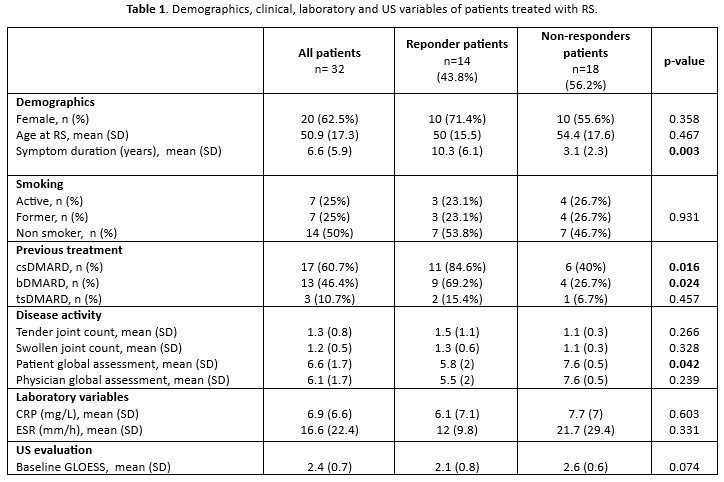Session Information
Session Type: Poster Session C
Session Time: 10:30AM-12:30PM
Background/Purpose: Radioisotopic synoviorthesis (RS) is an intra-articular local therapy that uses radioisotopes for the treatment of chronic recurrent synovitis with inadequate response to conventional therapy. Its effectiveness evaluated by ultrasound (US) has not been studied to date, and the factors associated with good US response are currently unknown. The aim of this study is to evaluate the effectiveness of RS evaluated by US, as well as to determine the factors associated with US response
Methods: Retrospective, observational study by reviewing the medical health records of all patients treated with RS at a tertiary rheumatology center from June 2019 to December 2023. Demographic, clinical, and analytical data were collected. The effectiveness of RS evaluated by US is performed according to usual clinical practice at one month and six months post-RS. US response at 6 months was defined as synovitis ≤1 according to the US Global OMERACT-EULAR Synovitis Score (GLOESS). Both groups were compared by univariable analysis.
Results: Out of a total of 34 patients, 32 patients completed the US evaluation and were included for analysis (mean age was 50.9 years, 62.5% were female, and mean disease duration was 6.6 years). A total of 14 patients (43.8%) showed US response to RS. Patients achieving US response had longer disease duration (10.3 vs 3.1; p=0.003), received more csDMARDs (84.6% vs 40%; p=0.016) and bDMARDs (69.2 vs 26.7%; p=0.024), and significantly had lower patient global assessment (5.8 vs 7.6; p=0.042) compared to non-responders. Baseline GLOESS score was not associated with US response at 6 months.
Conclusion: Less than half of the patients treated with RS showed US response at 6 months follow-up. Longer disease duration, higher use of csDMARDs and bDMARDs, as well as lower patient global assessment, are associated with US response.
To cite this abstract in AMA style:
Bourgeois C, Cardoso-Peñafiel P, Villapún Burgoa B, Perez Pascual R, Nieto Gonzalez J, Álvaro-Gracia J, Calvo-Aranda E, Molina-Collada J. Radioisotopic Synoviorthesis: Factors Associated with Good Response Evaluated by Ultrasound [abstract]. Arthritis Rheumatol. 2024; 76 (suppl 9). https://acrabstracts.org/abstract/radioisotopic-synoviorthesis-factors-associated-with-good-response-evaluated-by-ultrasound/. Accessed .« Back to ACR Convergence 2024
ACR Meeting Abstracts - https://acrabstracts.org/abstract/radioisotopic-synoviorthesis-factors-associated-with-good-response-evaluated-by-ultrasound/

